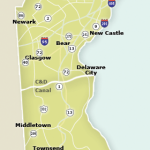Hip-hop artist, actor and ASL performer Warren Snipe drew national praise for his dramatic interpretation of the national anthem and “America, the Beautiful” at the Super Bowl. Snipe, who describes himself as “a rapper who happens to be Deaf,” says he has worked for years to bring more attention to both Deaf culture and hip hop. He calls his style, a mixture of images and audio, “Dip Hop” – hip hop through Deaf eyes.
A consortium of institutions including Nemours, the Children’s Hospital of Philadelphia and Yale University are examining nationwide insurance data to find possible reasons explaining a dip in premature birth rates during the Covid-19 pandemic. Researchers intend to examine personal medical factors, including how often the mother attended prenatal doctor visits and what tests were administered, and socioeconomic factors such as whether the hospital was in an urban or rural area.
More than 2,200 people have signed up for the 2021 Polar Bear Plunge, Special Olympics Delaware’s biggest annual fundraiser, although Covid safety restrictions prevent the typical events – a run into the ocean from Rehoboth Beach. In the nearly 11 months since the pandemic began disrupting Special Olympics Delaware events, athletes and coaches have taken to gathering online 2–3 times per week for workout sessions and anticipate playing spring sports outdoors in person.
New Castle County, Delaware’s most populous county, has agreed to reassess property values for taxation purposes for the first time in more than 30 years, settling part of a lawsuit seeking to revamp the state’s school funding system. The reassessment will take effect in fiscal year 2024. The lawsuit alleged that Delaware underfunded schools that have large populations of students with disabilities, students from low-income households or English language learners. Local property taxes make up about a third of Delaware school districts’ funding.
The U.S. Department of Education (DOE) started investigations of possible discrimination against students with disabilities in school districts in Virginia, Indiana, California and Washington. Reporting from Indiana and Washington suggests the DOE’s attention is due, in part, to local news stories about teachers refusing to offer tailored instruction or other accommodations to students with disabilities during periods of remote learning.





